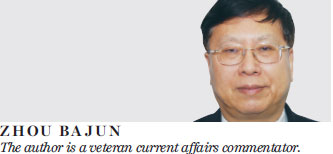SAR must respect central government's jurisdiction
Updated: 2015-01-29 09:24
By Zhou Bajun(HK Edition)
|
|||||||
The crucial point about Hong Kong's constitutional arrangements is that as a special administrative region (SAR) of the People's Republic of China it comes directly under the jurisdiction of the Central People's Government. This constitutional relationship between the central government and Hong Kong is a reality which is unique and cannot be changed. Moreover, it should be noted that Article 23 of the Basic Law has yet to be enacted in Hong Kong.
Macao is also a SAR of China, but it is different from Hong Kong in terms of its relationship with the central government. President Xi Jinping praised Macao in a speech late last year. This was to commemorate the 15th anniversary of Macao's return to China and the inauguration of the fourth-term government of the Macao SAR.
Xi said over the last 15 years "the principles of 'One Country, Two Systems' and 'Macao people governing Macao"' had worked very well. The president noted that Macao still enjoyed a high degree of autonomy and that the Basic Law of the Macao SAR was enthusiastically supported by the people of Macao.
Moreover, the governance of Macao, as outlined by the Constitution and the Macao Basic Law, has been respected and adhered to. The central government's overall power is effectively exercised there while Macao's high degree autonomy "is fully guaranteed". The key point for Hong Kong is that, as in Macao, "the central government's overall governing power" must also be upheld and fully exercised.
The white paper issued by the Information Office of the State Council on the practice of the "One Country, Two Systems" policy in Hong Kong elaborates clearly on the overall governing power of the Central People's Government. Under the title "The central leadership directly exercises jurisdiction over the HKSAR in accordance with the law", the paper says Beijing's jurisdiction over Hong Kong means "the HKSAR comes directly under the Central People's Government, and its Chief Executive is accountable to the Central People's Government.
"The Central People's Government appoints the Chief Executive and the principal officials. It is responsible for foreign affairs relating to the HKSAR in accordance with the law and issues directives to the Chief Executive," it adds.
However, since Hong Kong's third-term Chief Executive (CE) took office in 2007, some principal officials in the government were appointed because of political compromises rather than direct decisions by the central government. Due to vested interests dating back to the colonial era and a shortage of political talent in the "Love Nation and Love Hong Kong" camp, Hong Kong's body of top officials has been made of a mixture of people from quite different political backgrounds.
This leads us to some important questions. Why was the introduction of national education in primary and secondary schools brought to an abrupt end? Why did some principal officials give in to the opposition and advocate policies of "Hong Kong permanent residents' interests first"? Why can a few principal officials (under the pretext of upholding the Basic Law) occasionally speak on behalf of the opposition? Why are the authorities in the city too afraid and reluctant to re-enact Article 23? One answer to these questions is that the central government has yet to fully exercise its powers to appoint all principal officials in the HKSAR government.
Some local political observers have noted that under the current electoral mechanism, it is questionable whether the CE has consistently been accountable to the central government. In retrospect, the CE has at times been accountable to the opposition and their supporters. This is either because of his political background or mainly due to the city's complex political divisions.
If Hong Kong was to have universal suffrage for both the election of the CE and Legislative Council in the way suggested by the opposition camp, the central government would lose its jurisdiction over Hong Kong. This cannot happen. There can be no room for compromise between the opposition's demands for "genuine universal suffrage" and the electoral framework for the selection of the CE by universal suffrage as outlined by the Standing Committee of the National People's Congress (NPCSC).
What the HKSAR Government has to do, with the full backing of the central government, is to fully and accurately implement the Basic Law and the principle of "One Country, Two Systems". In this regard the timely warnings of CE Leung Chun-ying's 2015 Policy Address are worth remembering. Leung rightly criticized Undergrad, the official magazine of the Hong Kong University Students' Union, for advocating separatism.
Unlike Macao, Hong Kong has wasted too much time on political struggles at the cost of economic development and improving people's livelihoods. Hong Kong must get back on track.

(HK Edition 01/29/2015 page1)